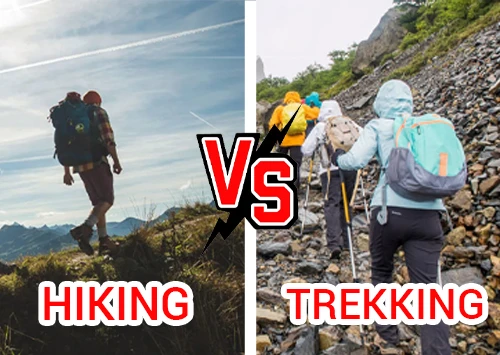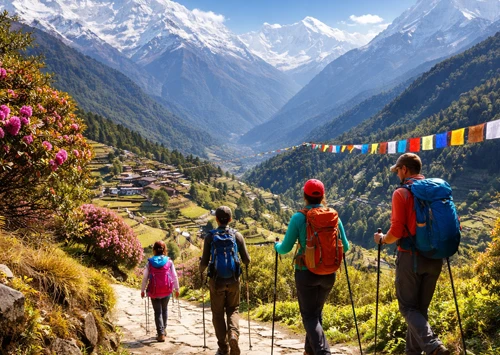Importance of Physical Training for the Everest Base Camp Trek.
Physical training is crucial when preparing for the Everest Base Camp Trek. This challenging trek will test your endurance, strength, and mental resilience. Without adequate preparation, you may find yourself struggling to keep up with the demands of the trail. Proper physical training helps you physically and boosts your confidence and mental preparedness for the journey ahead.
Assessing your fitness level is the first step in creating an effective training plan. Consult with a healthcare professional or a fitness trainer to evaluate your overall fitness and identify any areas that need improvement. This will help you set realistic goals and tailor your training program to your needs. Remember, everyone's fitness level is different, and it's essential to listen to your body and progress at a comfortable pace.
Creating a personalized training plan for Everest Base Camp Trek ensures you target the right areas and gradually build up your strength and endurance. Your training plan should include cardiovascular exercises, strength training exercises, flexibility exercises, and hiking or stair climbing in the Everest Region.
Cardiovascular Exercises for Endurance.
Building cardiovascular endurance is crucial for the Everest Base Camp Trek, as you will be walking for several hours each day at high altitudes. Engaging in activities such as running, cycling, swimming, or brisk walking will help improve your aerobic capacity and prepare your body for the demands of the trek.
Aim for at least 30 minutes of moderate to high-intensity cardiovascular exercise at least 3-4 times a week. Gradually increase the duration and intensity of your workouts as you progress in your training. It's important to remember that consistency is key, so make sure to stick to your training schedule.
Strength Training Exercises for Trekking Muscles.
In addition to cardiovascular exercises, incorporating strength training exercises into your training regimen will help you build muscle strength and endurance for the Everest Base Camp. Focus on exercises that target your lower body, including squats, lunges, step-ups, and calf raises. These exercises will strengthen your leg muscles, essential for trekking uphill and downhill. Remember to include exercises for your core, such as planks and Russian twists, as a strong core will provide stability and improve your balance on uneven terrain.
Flexibility Exercises for preventing Injuries.
Flexibility is often overlooked in training programs, but it plays a crucial role in preventing injuries during the Everest Base Camp Trek. Incorporate stretching exercises into your routine to improve your flexibility and range of motion. Focus on stretching your hamstrings, quadriceps, calves, hip flexors, and shoulders. Yoga or Pilates classes can also improve flexibility and enhance overall body strength. Remember to warm up before stretching and never push yourself too hard, as overstretching can lead to injuries.

Incorporating Hiking and Stair Climbing into your Training.
To simulate the conditions of the Everest Base Camp Trek, it's important to incorporate hiking and stair climbing into your training. These activities will help you get accustomed to walking on uneven terrain and climbing uphill. Start with shorter hikes or stair climbing sessions and gradually increase the duration and difficulty as you progress. You can also try carrying a backpack with some weight to simulate the load you will be carrying during the trek. This will help condition your muscles and prepare you for the physical demands of the journey.
Altitude Training and Acclimatization.
One of the biggest challenges of the Everest Base Camp Trek is the high altitude. As you ascend, the air becomes thinner, making it harder for your body to get the oxygen it needs. To prepare for this, consider incorporating altitude training into your regimen. This can be done by using an altitude training mask or by training at higher altitudes if you have access to such locations. Gradual acclimatization is also crucial during the trek itself. Take your time and allow your body to adjust to the changing altitude. Stay hydrated, eat nutritious meals, and listen to your guide's advice on acclimatization stops and rest days.
Nutrition and Hydration Tips for Trekking.
Trekking planner Nepal recommends proper nutrition and hydration, essential for maintaining your energy levels and staying healthy during the Everest Base Camp Trek. Focus on a balanced diet that includes carbohydrates for energy, lean proteins for muscle repair, and healthy fats for sustained energy. Pack lightweight, nutrient-dense snacks such as nuts, dried fruits, and energy bars to fuel your body during the trek. Hydration is also key, so drink plenty of water throughout the day and avoid excessive caffeine and alcohol consumption, as they can contribute to dehydration.
Mental Preparation for the Everest Base Camp Trek.
Preparing for the Everest Base Camp Trek is not just about physical training; it also requires mental preparation. The trek can be mentally challenging, with long days of walking, unpredictable weather conditions, and the constant need to push yourself outside your comfort zone. Practice mental exercises such as visualization and positive affirmations to build mental strength and prepare yourself for the journey ahead. Surround yourself with a supportive network of friends and family who will encourage and motivate you throughout your training and trek.

Packing Essentials for The Trek.
The right gear and equipment are crucial for a successful Everest Base Camp Trek. Invest in a good-quality, sturdy pair of hiking boots that provide ankle support and waterproofing. Layer your clothing to adapt to changing weather conditions, and pack a warm sleeping bag suitable for cold temperatures.
Other essentials include a backpack, trekking poles, sunglasses, sunscreen, a first aid kit, and a headlamp. Make sure to check with your trekking guide or Trekking Planner Nepal Team for a comprehensive packing list tailored to the specific requirements of the trek.
Hiring a Trekking Guide or Joining a Group.
While it is possible to trek to Everest Base Camp independently, hiring a trekking guide or joining a group can greatly enhance your experience and ensure your safety. A knowledgeable guide will provide valuable information about the trail, help with navigation, and offer support throughout the trek. They will also be familiar with altitude-related illnesses and know how to handle emergencies. Joining a group can also provide a sense of friendship and make the trek more enjoyable. Research for Trekking Planner Nepal and read reviews to find a guide or group that suits your needs.
Safety Precautions and Emergency Preparedness.
Safety should be a top priority when preparing for the Everest Base Camp Trek. Familiarize yourself with the risks and hazards of trekking at high altitudes and take necessary precautions. This includes getting comprehensive travel insurance that covers trekking activities, carrying a personal locator beacon or satellite phone for emergencies, and ensuring you have a well-stocked first aid kit. Follow the advice of your trekking guide, stay on designated trails, and be aware of your physical limitations. Prioritize your safety above all else.
Conclusion: Ready to Conquer the Everest Base Camp Trek.
Congratulations! You have now learned the proven physical training tips from Trekking Planner Nepal to prepare for the Everest Base Camp Trek. Following these tips will build the necessary strength, endurance, and mental resilience to conquer Mount Everest. Remember to assess your fitness level, create a personalized training plan, focus on cardiovascular and strength training exercises, incorporate flexibility and hiking, and prepare for the high altitude.
Pay attention to your nutrition and hydration, mentally prepare yourself, pack the right essentials, consider hiring a guide or joining a group, and prioritize safety. With proper preparation and determination, you will be ready to embark on this extraordinary journey and create memories that will last a lifetime. So, lace up your hiking boots and conquer the Everest Base Camp Trek!
Explore Nepal Trekking Planner's Everest Base Camp Trekking Packages:
Everest Base Camp Trekking: 15 Days
Everest Luxury Lodge Trekking-14 Days
Ama Dablam with Everest Base Camp Trek-15 Days
Everest Base Camp Trek by Road: 17 Days
Everest High Passes Trek








